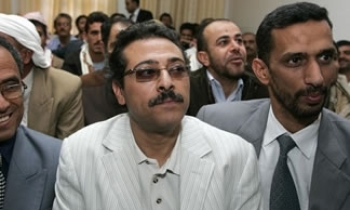Indian journalist Palagummi Sainath has been named as one of the seven winners of the 2007 Ramon Magsaysay Awards in recognition of his passionate reporting about the condition of India's rural poor.
"In electing Palagummi Sainath to receive the 2007 Ramon Magsaysay Award for Journalism, Literature, and Creative Communication Arts, the board of trustees recognises his passionate commitment as a journalist to restore the rural poor to India's consciousness, moving the nation to action," the citation said.
Also chosen for this year's awards was Chen Guangcheng, a blind Chinese activist who is serving a four-year prison term after exposing forced abortions and sterilisation in northern China in 2005. Other winners include Jovito Salonga, a former Phillipine Senate president who fought late dictator Ferdinand Marcos, for government service; Kim Sun-Tae, a blind Christian pastor who founded a church for the visually impaired and helped build an eye hospital for the rural poor in South Korea, for public service; and Mahabir Pun, who helped connect rural villages in Nepal to the Internet, for community service.
Tang Xiyang, an environmentalist who institutionalised annual Green Camps in China for university students to advocate for environmental protection and conservation got the award for peace and international understanding while Chung To, a banker who created a foundation that addressed the AIDS crisis in Hong Kong and mainland China through education and counselling of infected individuals and their families, was given the award for emergent leadership.
Each of the winners will also receive cash prizes of 50,000 US dollars. The foundation, named after former Phillipines President Ramon Magsaysay who was killed in a plane crash, was set up in 1957 by trustees of the New York-based Rockefeller Brothers Fund. The awards, based on six categories, are given yearly to individuals and groups in Asia.
Sainath is the sixth Indian print media journalist to win the award. The previous awardee was RK Laxman in 1984.
In choosing to give the award to Sainath, 50, the foundation noted he believes that "journalism is for people, not for shareholders," and has "doggedly covered the lives of those who have been left behind."
Born in Chennai in 1957 into a distinguished family in Andhra Pradesh (he is grandson of former President VV Giri), Sainath completed his master's degree in history from the Jawaharlal Nehru University (JNU) in New Delhi. He started his career as a journalist with the United News of India (UNI). He later joined the weekly magazine, Blitz, and rose to become its deputy chief editor and a popular columnist.
In 1993, he was awarded a fellowship from the Times of India, which enabled him travel to and investigate life in India's ten poorest districts, which resulted in 84 articles, many of which were reprinted later in his bestselling book, Everybody Loves a Good Drought.
The foundation said that in that book and in hundreds of subsequent articles, Sainath "presented his readers with a world that belied the giddy accounts of India's economic miracle. In this India, the harsh life of the rural poor was, in fact, growing harsher. Sainath discovered that the acute misery of India's poorest districts was not caused by drought, as the government said. It was rooted in India's enduring structural inequalities-in poverty, illiteracy, and caste discrimination-and exacerbated by recent economic reforms favoring foreign investment and privatisation. Indeed, these sweeping changes combined with endemic corruption had led small farmers and landless laborers into evermore crippling debt-with devastating consequences.
"Sainath provided the evidence. He reported, for example, that the number of migrant-swollen buses leaving a single poor district for Mumbai each week had increased from one to thirty-four in less than ten years. He exposed the shocking rise in suicides among India's debt-pressed farmers, revealing that in just six hard-hit districts in 2006 alone, the number of suicides had soared to well over a thousand. He revealed that at a time when officials boasted of a national grain surplus, 250 million Indians were suffering from endemic hunger, and that in districts where government storehouses were 'stacked to the roof with food grain,' tribal children were starving to death," the citation said.
It said Sainath's authoritative reporting led Indian authorities to address certain discrete abuses and to enhance relief efforts in states such as Tamil Nadu, Rajasthan, and Maharashtra. But his deeper message also struck home. In 2000, nearly thirty of his articles were submitted as evidence at a national hearing on anti-dalit (untouchable) atrocities. In such ways, he has touched the conscience of the nation.
Sainath now works for the Hindu as its Rural Affairs Editor.









